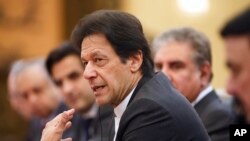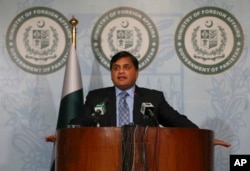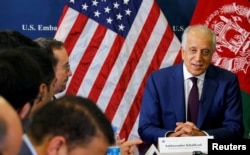U.S. President Donald Trump is seeking Pakistan's cooperation in bringing the Taliban to the table for negotiating peace in Afghanistan.
Pakistan Prime Minister Imran Khan said he received a letter Monday from Trump to inform him that U.S. special representative for Afghanistan reconciliation, Zalmay Khalilzad, is traveling to Pakistan this week for further discussions.
"He [Trump] wants Pakistan to play its part and use its influence to bring the Taliban to talks. We have a very prime position in it [Afghan peace], and we will certainly make an effort. I have long advocated for it [peace talks]," Khan said in remarks aired on state-run television.
The prime minister noted his critics used to mock and call him "Taliban Khan" for opposing military operations and advocating a political solution to the Afghan war.
"Thankfully, today the whole world wants Pakistan to bring them [Afghans] together [for peace talks]. ... This is what our role should be and we can do it," Khan said. He reiterated that Pakistan would "benefit the most" if peace is restored to Afghanistan.
"In the letter, the President recognizes that Pakistan has the ability to deny the Taliban sanctuary on its territory. The letter also makes clear that Pakistan's assistance with the Afghan peace process is fundamental to building an enduring U.S.-Pakistan partnership," said a spokesperson for Trump's National Security Council.
Earlier, Foreign Ministry Spokesman Mohammad Faisal separately issued a formal statement to share details of the letter.
Faisal said Trump acknowledged that the war had cost both the United States and Pakistan. The American leader went on to emphasize the two countries "should explore opportunities to work together and renew partnership," the spokesman added.
When asked about the letter Monday, U.S. Defense Secretary Jim Mattis said, "We are looking for every responsible nation to support peace in the subcontinent. And we'll cross this war in Afghanistan that's gone on now it's approaching 40 years — 40 years is enough.
"It's time for everyone to get on board, support the United Nations, support [Indian Prime Minister Narendra] President Modi, support [Afghan] President [Ashraf] Ghani and all those who are trying to maintain peace and make for a better world ... and we'll do our best to protect the Afghan people as the diplomats work to end the war," Mattis added.
The rare contact between the United States and Pakistan at the highest level comes as Islamabad's traditionally tumultuous relationship with the United States has deteriorated over allegations the Taliban continues to use sanctuaries on Pakistani soil for attacks inside Afghanistan.
Trump reiterated those allegations in a television interview and subsequent tweets last month, justifying his suspension of military assistance to Pakistan. The allegations prompted Khan to also take to Twitter and denounce the U.S. president for questioning Pakistan's counterterrorism efforts. The Pakistani leader insisted his country is being made "a scapegoat" for U.S. military "failures" in Afghanistan.
The 17-year Afghan war has intensified in recent months, with the Taliban inflicting heavy casualties on U.S.-backed Afghan security forces and bringing more territory under insurgent control. The U.S. military has lost more than 2,400 service members and spent nearly a trillion dollars since the war started in 2001.
The U.S. special envoy for Afghanistan peace, Khalilzad, has recently engaged the Taliban in direct talks to try to initiate Afghan peace negotiations.
The Taliban says it is discussing the withdrawal of NATO and U.S. forces from Afghanistan in talks with Washington.
Analysts increasingly believe Trump is considering pulling U.S. forces out of Afghanistan. Khalilzad last week said in a television interview that the president is in a "hurry" for peace in Afghanistan to end the suffering of the people in the strife-torn country.
NATO Secretary-General Jens Stoltenberg acknowledged Monday while speaking to reporters in Brussels that allied nations are paying "a high cost of staying in Afghanistan" in terms of financial and human losses. "But we have to compare the cost of staying with the cost of leaving," Stoltenberg noted.
Patsy Widakuswara and Carla Babb contributed to this report.






